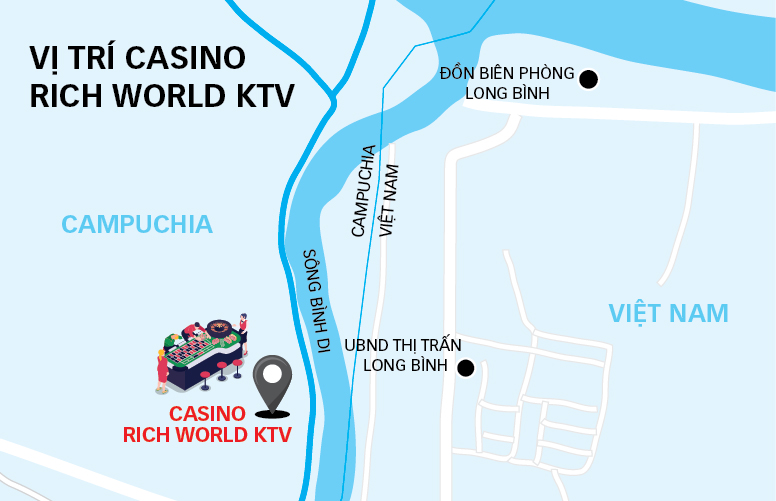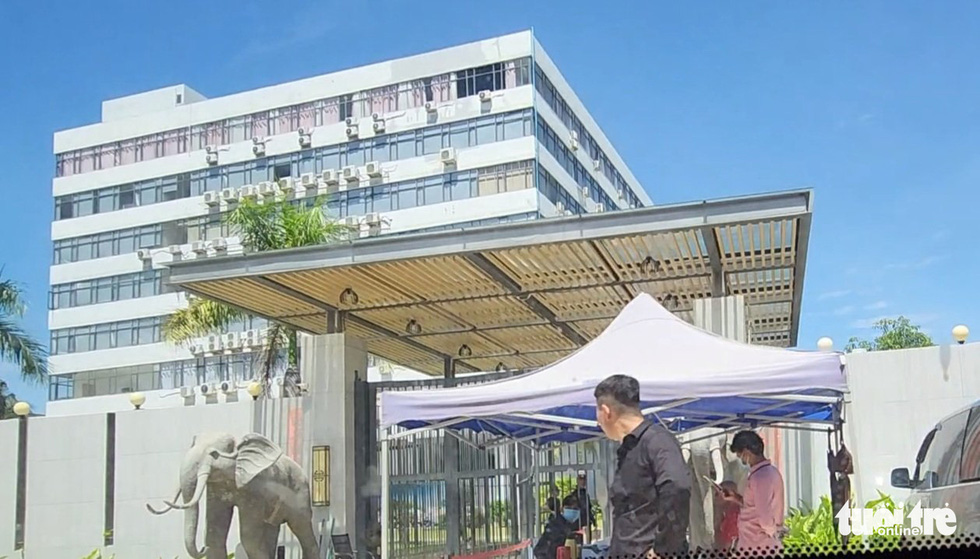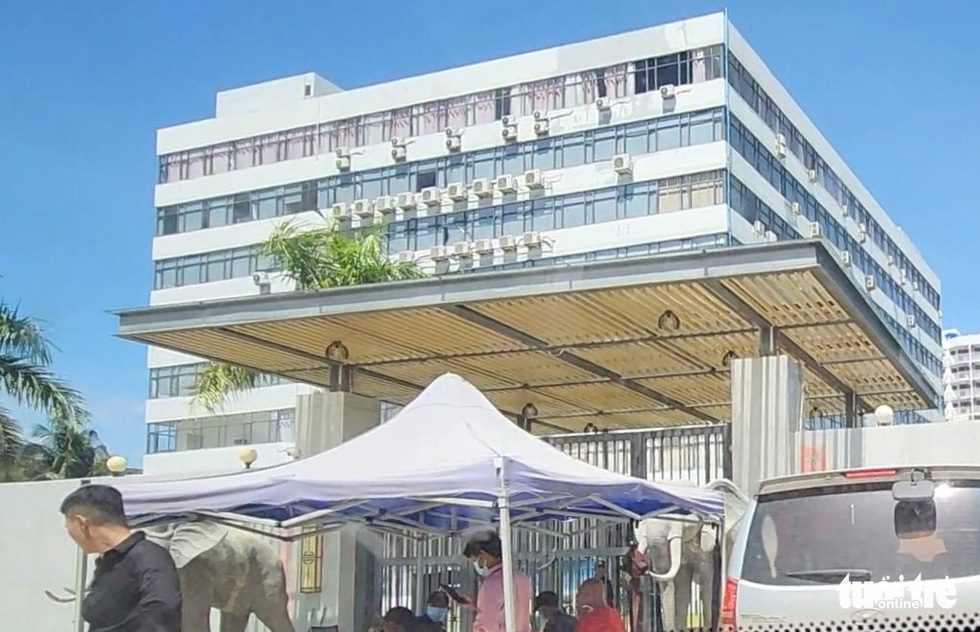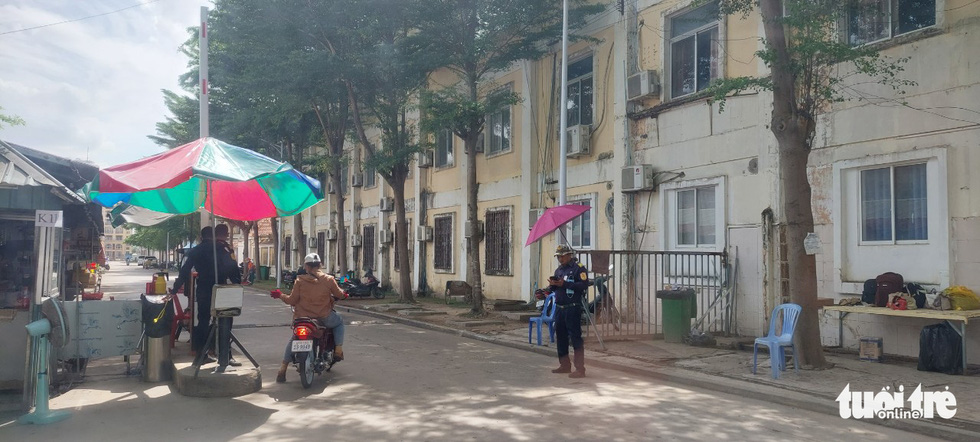Forty-two Vietnamese workers who had been lured to Cambodia and exploited for labor in casinos recently escaped back to Vietnam, where they told stories of being enslaved, children held for ransom, and luring other Vietnamese to join them.
Specifically, the 42 workers escaped from the Golden Phoenix Entertainment Casino in Kandal Province, Cambodia.
Tuoi Tre (Youth) newspaper reporters recently visited Golden Phoenix – a place dubbed 'hell 4.0.' by local residents.
Returning to the hell
The quickest way from Vietnam to Kandal Province’s Chrey Thom Hamlet is via the Long Binh Border Gate in An Phu District, An Giang Province.
These days, however, security on the Cambodian side of the border gate has been beefed up following news that 42 exploited Vietnamese workers had fled the nearby Golden Phoenix Entertainment Casino and swam across a river to Vietnam.
Part of Cambodia’s response to the incident has included detaching police from Phnom Penh to the border area and carrying out inspections of non-Cambodian residents in the province.
From the border gate, the road to Golden Phoenix – known locally as Two-Elephant Casino – is eroded and filled with potholes.
|
|
| Following the escape of 42 Vietnamese workers, the Golden Phoenix Entertainment Casino is under very strict security. Photo: D.T. / Tuoi Tre |
Outside the casino, groups of Chinese people loitered, on the lookout for anyone, or anything, that seemed unfamiliar.
“The roads are public property, but [the Chinese in the area] treat them like private assets. Strangers are constantly observed,” a Cambodian driver told the Tuoi Tre reporters.
“They always look angry. Even the locals are scared of them.”
The fact that workers are kept enslaved in the casino is not exactly a secret in Chrey Thom Hamlet.
Locals are aware, but feel helpless.
“Both adults and children are warned against coming close [to the casino],” said L., a local fisherman who explained that he feared what would happen if he, or anyone, helped those trapped inside.
Srey Mao, a local vendor in Chrey Thom, advised the Tuoi Tre reporters against visiting the Golden Phoenix, explaining that a local passer-by holding a cellphone had been beaten within an inch of his life shortly after the escape of the 42 Vietnamese workers.
Mao also claimed that the casino had hunted down a driver who filmed part of the escape.
Forced labor in Chrey Thom became big business shortly after an influx of Chinese investments in a series of casino projects along the nearby Bassac River.
These casinos quickly became a major draw for Vietnamese nationals who, unable to visit casinos in their own country, wanted a place to gamble and bet on cock fights.
Casino workers were eventually brought in from across Southeast Asia and Taiwan, many of whom work in dismal conditions and are prohibited from leaving.
Saving people from Golden Phoenix
L.D., a Vietnamese Cambodian, rescued four minors from northern Hai Phong City who went to work in a Chrey Thom casino in early 2022 but was subsequently subject to abusive working conditions and held for ransom.
According to D., in mid-April, he received a phone call from a man named L., who explained that his son and his son’s friends had been tricked into working at Rich World Casino.
D. contacted L.’s son – N.V.L., who was born in 2005 – and found out that he and the three friends, N.D.T., V.D.N.Q. and T.L.P., had gone to Cambodia in search of work.
The group found employment at the Yong Yuan Casino in Chrey Thum Hamlet, Sampeou Poun Commune, Kaoh Thom District, but were told they could not leave unless each paid $2,500.
D. eventually tracked down the exact location of Yong Yuan and visited the casino with the children's parents.
They could only pay the ransom for T. at that time as casino employees said the remaining three wanted to continue working to earn money so they had moved them to the nearby Golden Phoenix Entertainment Casino
 |
| The location of the Rich World Casino in Cambodia. Graphic: Tuan Anh |
“The parents of the minors and I visited Yong Yuan late at night on April 21 to pay T.’s ransom. The other three were already sent to the Golden Phoenix Entertainment Casino [several hundreds of meters away]," D. recounted.
“The next day, Golden Phoenix told us we would have to pay $5,000 for each of the other children."
That night, D. and the parents decided to rescue the other three children.
“It was relatively simple to pay ransom at Yong Yuan but it was dangerous at Golden Phoenix," D. said.
"We arrived at Golden Phoenix at midnight and they carefully checked the car before allowing us to get out.
“After meeting the children at the casino gate, the parents transferred the ransom to an account in Vietnam before being permitted to leave.
“Then, we drove as fast as possible because we were afraid of being tricked and caught.”
According to L., the boys’ nightmare in Cambodia began when they traveled to Ho Chi Minh City, Vietnam by bus and then took a 16-seater van across the border into Cambodia.
“The van windows were covered, so we didn’t know where we were. After crossing the border, we were taken to an empty house and then handed over to another group of people,” L. told Tuoi Tre.
At the Yong Yuan Casino, L. and his friends were told they would be working for illegal lending apps.
“We had to work 12 hours per day. Our main job was to send text messages to potential borrowers and instruct them on how to get loans," L. narrated.
“After working for over three weeks without being paid, we asked for leave but the manager did not agree.
"Instead, he asked us to pay $2,500 each.
“We were essentially put under house arrest.
"After work, we were told to stay in a room and were not allowed to leave.
"People who tried to escape were ruthlessly beaten."
According to L., the names of the apps were changed every month, making it impossible to pin down specific details.
Swindling fellow countrymen
An official in Cambodia’s Sihanoukville shared that Cambodians and Chinese have difficulties luring laborers from other countries, and therefore employ Vietnamese, Taiwananese, and Indonesians to recruit their respective fellow countrymen.
Once recruited, these laborers are subject to unpaid, forced labor.
V., a 20-year-old from Ke Sach District, Soc Trang Province, Vietnam is one of these victims.
“I heard that a Cambodian company was offering a monthly salary of $800. The only requirement was having typing skills, so I followed a broker to the border in Tay Ninh Province,” V. recollected.
“In Cambodia, I realized there were many Vietnamese luring other Vietnamese to play online games and gamble.”
V. was kept at a complex in Cambodia’s Svay Rieng Province, a short drive from Moc Bai Border Gate in Tay Ninh Province, Vietnam.
While at the complex, he was forced to cheat his compatriots until his family eventually paid his $3,500 ransom.
“During my first days at the complex, I asked my friends in Vietnam to top up their accounts. I thought that all the games had both winners and losers, but later realized that players could not withdraw money whether they won or not," V. said.
“Players were told that they had entered 'incorrect passwords,' then had their accounts locked and deleted.”
|
|
| A complex in Svay Rieng, where cheaters implicate others in online gambling rings, is strictly guarded. Photo: Tien Trinh / Tuoi Tre |
On a good day, V. was able to bring in as much as VND1 billion ($42,670) for the racket.
Many of these victims stopped playing once they realized they had been cheated, making it difficult for V. to secure repeat business.
Workers were also meant to hit specific targets, and those that failed were starved or tortured.
According to a seasoned casino owner in Ba Vet City, Svay Rieng Province, convincing players to deposit money into online gambling accounts that would never pay out has been popular since the Chinese began investing in Cambodian casinos.
“Gambling is banned in China, so Chinese people have opened hotels and resorts with online gambling services in Cambodia to serve gamblers from mainland China," the casino owner explained.
“Last year, the Cambodian government prohibited online gambling, so new games, and even stock exchanges, have been launched to appropriate money.
“To find new players, [the Chinese] recruit laborers from Southeast Asian countries to cheat their compatriots.”
T., also a casino owner in Ba Vet, said many Vietnamese people work actually for fraudulent network operators, not casinos, meaning that these casinos are essentially leased by third parties who then cheat punters.
S.C., an official in Sihanoukville, home to nearly 100 casinos developed by Chinese people, said that online fraud boomed during the height of the COVID-19 pandemic.
This was also a peak period for recruiting desperate laborers.
Unlicensed websites
In Vietnam, Internet users can have easy access to online gambling websites.
These websites often seek new users by continuously running ads, especially on unlicensed football channels.
One example of this occurs on Xoilac, a website which broadcasts live international football matches and often features ads for betting platforms Fun88, 188bet, tf88, m88, w88, jun88, and sodo66.
These ads feature promotions meant to attract new users, such as an VND800,000 ($34) bonus for new members, an iPhone 13 Pro after a top-up, a 100 percent bonus with a VND1 million ($43) top-up, commission of 40 percent for agents, and claims of the highest refund rates in the market.
|
|
| An unlicensed football website is full of betting ads. |
After clicking on an ad, users are sent to an account registration page where they are required to provide their phone number, emails, account username, and password.
They are also told to top up their accounts.
Oftentimes, these users are told they will receive a 100 percent bonus following their first top-up.
Multiple top-up methods are typically offered, including via e-wallets, banks, e-banking services, and scratch cards.
After topping up an account, a player may bet on sports, e-sports, live casino games, poker, and fish shooting.
An attractive introduction
Shbet, another betting platform, calls itself “a banker of an entertainment group headquartered in Cambodia with 10 years of operation in the online betting market.”
Shbet is also a leading banker in the Vietnamese online betting market and has attracted many bettors since the start of 2022.
It offers a diverse set of sport betting games, online casino games, fish shooting, cock fighting, and lottery services.
According to the website operator, it has established a professional technician team who continuously updates links on Shbet without being blocked by network operators in order to retain players.
Like us on Facebook or follow us on Twitter to get the latest news about Vietnam!






















































